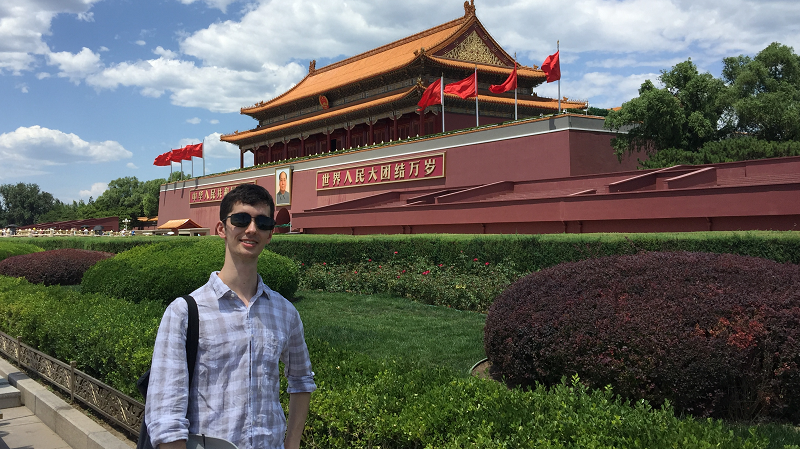Jeremy Boyle (BSc Biology), who recently graduated from Bath, learned Mandarin Chinese during his studies. He visited China for the first time this summer and shares his impressions of the country and how his trip dramatically improved his language skills.
This summer, I seized an opportunity to go to Beijing, my first time in China. While I had been to neighbouring Japan, Beijing was unlike anywhere I had been to before.
Seeing the sights
I went with a Chinese friend from my course and stayed at his house, setting out each day to all the major tourist attractions in Beijing: the Summer Palace (颐和园Yíhéyuán), the Great Wall (长城 Chángchéng), Lama Temple (雍和宫 Yōnghé gōng), Tiananmen Square (天安门 Tiān'ānmén), and the Forbidden City (故宫 Gùgōng), just to name a few.
The June sun over Beijing was ferocious, but I was adamant to make the most of my week. I’ll spare you an exhaustive list of everything I ate, but there was plenty of hotpot and intestines, delicious crayfish and duck, healthy home cooking, and some oddities like pig’s brain.
Speaking Chinese
But I’m sure what my teacher Daisy Zhu (朱老师 Zhū lǎoshī) is most interested in is how I fared with the language.
For context, I’ve been studying Chinese for four years, initially self-taught before enrolling onto the Lower Intermediate, Intermediate, and Learn Chinese with Weekly News classes with the Skills Centre, as well as participating in the University’s Virtual Exchange Programme with Xi’an International University.
My intermediate Chinese served me well in simple conversations, in shops, with staff and security. I was able to handle longer conversations with my friend’s family with a little help, and even started talking in Chinese to my friend. When in Rome… (入乡随俗 Rùxiāngsuísú).
In a single week, I felt my feel for the language (语感 yǔgǎn) improve dramatically. Frequent occasions where my language skills were wanting became a new source of motivation.
Uncovering China
I think the greatest part about my trip was simply being able to see the country I had learnt so much about. Perhaps cliché, my initial motivation to study Chinese was to better understand the Chinese people, beyond abstractions and stereotypes.
My limited Chinese allowed me to do just this, by hearing mainlander perspectives on everything from daily life to the economy and seeing Beijing life from the heart of national politics to the quiet traditional neighbourhoods (胡同 hútong).
I saw old China, in the magnificent bronzes in museum exhibits and traditional architecture, and new China: skyscrapers, ubiquitous QR code payments, spotless subways and facial recognition vending machines. This contrast between old and new was one of the most fascinating aspects of my trip.
Travel tips
The prevalence of technology in daily life can make it tricky as a foreigner outside of the system without the right mini-apps or a Chinese bank account (many of my Alipay payments were rejected and my friend had to bail me out several times...)
My word of advice is to stick with a Chinese friend or a tour group and you’ll have a fantastic time.
What next?
With newfound motivation, I intend to keep up my Chinese with a mix of graded readers, grammar Anki decks, media immersion and talking to native speakers with apps like HelloTalk.
Attending Chinese classes at the University each week helped me stay on track with my practice and greatly improved my proficiency, so now that I’ve graduated I need to take extra care to make Chinese study a self-directed daily habit.
I’ve found that having insights into someone’s language and culture is a surefire way to make friends, which helps when there are so many ethnic Chinese scientists in UK institutions and abroad (China now publishes the most academic papers of any country after all!)
I believe my cultural understanding cultivated through language learning will allow for better collaboration and competition with Chinese colleagues in the future.
But I only tasted a small slice of China. I’ll most definitely be back, equipped with better Chinese.
Next up: Shanghai, Xi’an, or who knows where?
Respond







